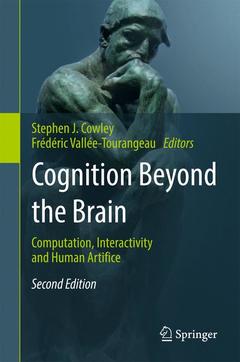Description
Cognition Beyond the Brain (2nd Ed., Softcover reprint of the original 2nd ed. 2017)
Computation, Interactivity and Human Artifice
Language: English
Subjects for Cognition Beyond the Brain:
Keywords
Interactivity; Distributed cognitive ecosystems; Agency; Languaging; Insight
Publication date: 04-2017
Support: Print on demand
Publication date: 07-2018
Support: Print on demand
Description
/li>Contents
/li>Biography
/li>Comment
/li>
This new edition continues to demonstrate how a systemic perspective casts a productive light on thinking in applied domains such as crime scene analysis, the use of information technology in construction, and computer-meditated trusts and presents new studies on the cognitive ecology of the web, multi-scalar temporal and organisational cognition and the importance of interactive material engagement in digital architecture. Authors use various scales of the systemic viewpoint to illustrate how bodies and artefacts shape thinking, but in all cases the experience of materiality is meshed with activity that involves the world beyond the body.
Cognition Beyond the Brain is a valuable reference for researchers, practitioners and graduate students within the fields of Computer Science, Psychology, Linguistics and Cognitive Sciences.
Introduction.- Socially Distributed Cognition in Loosely Coupled Systems.- Distributed Cognition at the Crime Scene.- Thinking with External Representations.- Human Interactivity: Problem-solving, Solution-probing and Verbal Patterns in the Wild.- Linden Ball and Damien Litchfield: Interactivity and Embodied Cues in Problem Solving, Learning and Insight: Further Contributions to a “Theory of Hints.- Cognition beyond the Classical Information Processing Model: Cognitive Interactivity and the Systemic Thinking Model.- Time During Time: Multi-Scalar Temporal Cognition.- Human Agency and the Resources of Reason.- Living as Languaging: Distributed Knowledge in Living Beings.- Cognition in the City.- Computer-mediated Trust in Self-interested Expert Recommendations.- The Cognitive Ecology of the Web.- Material Engagement Theory and Digital Culture.- Organisational Cognition: A Step too Close.
Stephen J.Cowley is Professor of Organisational Cognition at the University of Southern Denmark. He has developed ways of integrating the study of language, cognition and the sociocultural world and in 2012 he took up his current position in Denmark where he is concerned with how organisations rely on cognitive resources beyond the body. He founded the Distributed Language Group, a community who aims to naturalise language by focusing on how directed, dialogical activity imbues human intelligence with a collective dimension that also makes literacy possible.
Frédéric Vallée-Tourangeau is Professor of Psychology and Director of Postgraduate Research at Kingston University, UK. He holds a BA from McGill University, an MA from the University of Pennsylvania, and a PhD from McGill University. His most recent research explores the role of interactivity in the genesis of insight.




